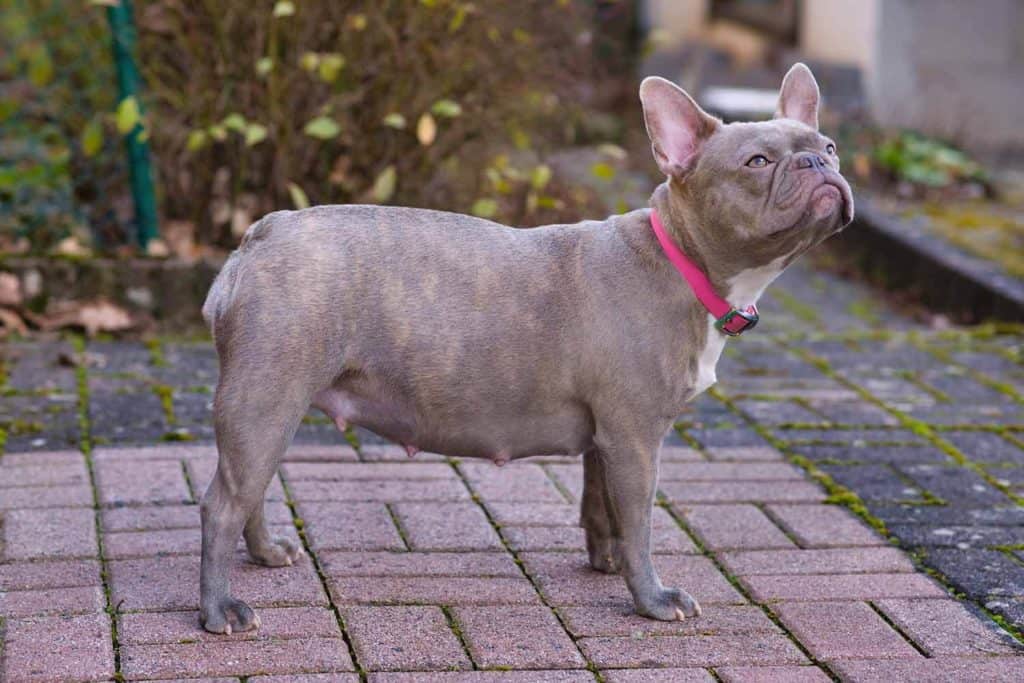
Have you ever wondered whether, by virtue of your Frenchie’s small size, her gestation period is shorter relative to other bigger breeds? Or, you may have considered being a breeder and are seeking more information. In this article, I’m going to answer questions like, ‘how long are French bulldogs pregnant for?’, and show you what you can expect from a French Bulldog pregnancy week by week.
Regardless of their unnatural origin, French Bulldogs’ gestation period lasts approximately 63 days from conception. Your Frenchie may whelp earlier than 63 days. As such, the most accurate figure is anywhere between 58 and 63 days.
Can French Bulldogs get pregnant naturally?
French bulldogs aren’t natural, they’re a creation of man as a crossbreed of the English bulldog and smaller terrier breeds. For this reason, most female Frenchies can’t get pregnant naturally, and breeding is done through artificial insemination.
Besides the selective breeding over the years, Frenchies also have health challenges, some of which make it hard for the male Frenchies to mount the bitches. In some rare cases, however, this breed can get pregnant naturally.
Understanding French Bulldog Pregnancy

A Frenchie attains sexual maturity by experiencing her first heat cycle at the age of six months, although the exact time falls within a range of 6 to 12 months. In some infrequent instances, this breed goes into heat as late as 14 months.
Notably, therefore, if you intend to spay or neuter your Frenchie, it’s recommended that you do so before she attains the age of six months, that is, before she becomes sexually mature. Upon becoming an intact Frenchie (one that hasn’t been spayed or neutered), your dog will go into heat twice per year.
Let Your Frenchie Mature Before Breeding
It’s only while your Frenchie is on the heat that she is fertile enough to conceive. However, it’s advisable to let your dog fully mature before breeding her. This implies that you should wait until your Frenchie has gone into heat at least twice before considering artificial insemination. At this stage, her body and organs are fully grown to carry and support a litter of puppies. Failure to adhere to these directions could lead to stunted growth. Your Frenchie will forever have a puppy-like body.
Again, for your Frenchie to deliver the best litter, it’s vital to choose the best genes. For this, I advise that you look for a recognized breeder. Additionally, you should also be in a financial position to handle the litter of puppies, mainly if they don’t find new homes.
The heat cycle
The heat cycle in French bulldogs lasts about three weeks. If you find a suitable stud, and fertilization is fruitful, your dog will conceive. Of importance is the fact that conception is preceded by a series of stages that are regulated by hormones. There are four stages in total, and they constitute what is known as the reproductive cycle.
- Proestrus
This first stage has two fundamental indicators: your Frenchie’s vulva will swell, and she’ll also have a bloody discharge. As such, you should use a puppy diaper. At this stage, your dog will start attracting male dogs, although it’s not uncommon for her to reject their advances until the onset of the second stage.
You will notice the rejection through a behavior known as tail tucking, where she’ll sit or lower her abdomen to keep the male dogs from either coming up to her or smelling her. She may also become either grumpier or more affectionate than usual. She may also have an increased or lower appetite. Proestrus lasts for approximately 9 days.
- Estrus
This stage is characterized by the lightening of the bloody discharge you’ll have witnessed during proestrus (it’ll turn from red to pink); the volume also decreases. Secondly, your dog’s vulva will be soft and enlarged. Estrus lasts between three and 21 days. During this stage, your Frenchie will be receptive to male dogs since she’ll be fertile.
Your vet will take blood tests and vaginal smears during these first two stages to determine the best time to breed your dog.
- Diestrus
At this stage, the bitch no longer accepts any advances, nor does she allow mating. Diestrus occurs typically on the 14th day. During this stage, the discharge reddens and ultimately diminishes while the vulva becomes normal. When there is no sign of swelling or no discernible discharge, then the bitch is no longer on heat.
- Anestrus
This is the period of sexual dormancy or inactivity between diestrus and the first day of proestrus.
How can you tell if your French Bulldog is Pregnant?

Unlike in human beings, determining whether your Frenchie is pregnant or not isn’t that easy. This is partly because she won’t show any signs of pregnancy during the first few weeks. It’s only after three weeks that you’ll start noticing changes. As such, to determine accurately whether she’s pregnant, you should visit your vet who is likely to use any of the following four methods:
X-ray
This method is performed to determine the number of puppies the bitch is carrying.
Hormone test
The accuracy of this method relies on time. Your Frenchie should have been pregnant for at least 30 days.
Ultrasound
This is the best method to use, particularly early on during pregnancy period.
Palpation
This method entails feeling the fluid-filled sacs that cover the fetuses. It’s only possible between the 3rd and 5th weeks of pregnancy, after which the sacs no longer have a distinct shape. After that, it’s impossible to feel them. Instead, you might feel something soft which you could mistake for fat. The palpation method is considered the most convenient and bargainous.
French Bulldog Pregnancy Week by Week

Week One
Week one typically starts when ovulation occurs. During this week, your Frenchie will ovulate, mate and her eggs will be fertilized. Depending on your dog, there might be no changes to how they eat or the activities they engage in; in other French Bulldogs, you might notice some changes. Also, she may experience some morning sickness characterized by vomiting.
Nonetheless, in all Frenchies, some pink discharge will ooze from the vulva, which is normal, and you shouldn’t panic. At this stage, the soon-to-be embryos are just cells that are yet to start growing.
Week Two
The embryos begin to develop at week two. Also, they’ll have transitioned into the uterus. Your Frenchie won’t exhibit any signs or changes.
Week Three
If an ultrasound is carried out, you’ll likely see that the embryos have started developing correctly, and their shapes are discernible. They’re, however, still small, measuring about 1 centimeter in length. They’ll have also implanted. Like in week two, your Frenchie is unlikely to show any additional signs, although their heightened hormonal levels are likely to lead to the onset of morning sickness. Your Frenchie may exhibit increased appetite.
Week Four
The embryos’ heartbeats can now be detected, particularly from day 22. Their spine and facial features such as eyes start forming, and they soon begin resembling a dog, although they measure about 1.5 centimeters in length. This is 50% of their size.
You need to note that it’s only after the beginning of week four that your vet can use palpations to determine the pregnancy. It’s also from week four that you’ll start noticing changes in your Frenchie’s body. For instance, she’ll begin discharging clear fluid from her vulva. Also, her nipples become swollen. You’ll even notice increased appetite, and she’ll, therefore, feed more.
You should also be cautious during this period since the embryos are the most vulnerable. As such, avoid subjecting your dog to any demanding physical activities.
Week Five
At this stage, the fetuses start developing whiskers, feet, and claws. Their genitalia also starts forming. Your French bulldog’s weight will start increasing, and you should increase their food intake to facilitate the development of the puppies.
At this stage, the puppies are less vulnerable since the amniotic fluid increases, ensuring more protection. The uterus will also start feeling soft and floppy. From this stage forward, palpating the mother is no longer feasible, and your vet will begin using the ultrasound more frequently. No small meals for a pregnant French Bulldog at this stage.
Week Six
Your Frenchie will look larger and pregnant, with her growth now being faster than ever before. Other notable changes include darker nipples. You’ll have to give your dog more food since she’ll have developed a great appetite. You should diversify her diet by adding supplements and puppy food in addition to her regular food.
Your Frenchie will start nesting from week six. Therefore, you should find the most appropriate location that is secure and quiet to enable her to relax.
In the uterus, the puppies will start developing their distinct colors and patterns.
Week Seven
Your dog will start shedding hair, especially from her stomach in preparation for birth. At this time, the puppies are almost fully formed, but they’ll definitely continue growing.
It’s advisable to discontinue the administration of puppy food to prompt the mother’s body to start storing calcium, which is vital, particularly at the end of the gestation period, as it’ll help the puppies grow stronger and bigger.
Week Eight
Your French Bulldog can give birth as early as week eight. As such, you should be prepared for this eventuality. However, to avoid early delivery, you should ensure that your Frenchie is always relaxed and minimize physical activity.
On close observation, it’s possible to see the puppies move in the womb, mainly as she rests.
Week Nine
You’ll notice a change in appetite and feeding habits. Your Frenchie will be more withdrawn as she prepares to whelp.
You can tell exactly when your dog will go into labor by consistently checking her temperature throughout week nine. That way, you’ll know her average temperature, which makes it possible to determine a drop. French Bulldog’s temperature decreases immediately before labor by about 1.5°C. Notably, their normal average temperature ranges between 38.3°C and 39.2°C.
Labour and Delivery
I emphasize the need for a vet when your Frenchie is going into labor. The signs to look out for before labor include:
- Excessive panting
- Restlessness
- Walking around
The indicators that signal the onset of labor include the following:
- Your Frenchie will start trembling
- She’ll then lie down and start pushing
Labour complications aren’t uncommon. You can quickly tell this by observing your Frenchie. If she pushes continuously for 20 minutes and you can’t see a puppy’s head, call your vet immediately.
French Bulldog Pregnancy Problems
A 2019 study by the Royal Veterinary College (RVC) revealed that Frenchies are 16 times more likely to develop dystocia (difficult births as a result of small maternal pelvises) than any other bitch a product of crossbreeding. As a result, female Frenchies are 2.4 times more likely to undergo c-sections than other crossbred breeds.
A second study established that 67.9% of all sampled French bulldogs with dystocia required a cesarean section. As such, while your Frenchie may develop labor and birth complications, she may still whelp normally. It’s only under extreme conditions that your vet will conduct an invasive c-section.
Can French Bulldogs give birth naturally? Yes, 32.1% of the time.
The dystocia arises from their body types. Adult Frenchies have narrow hips. The puppies, on the other hand, have big heads. These features make it hard for the mothers to push the pups through the birth canal. In some instances, the puppies even get stuck.
Breeding French Bulldogs and Related Costs
Breeding Frenchies is an expensive affair owing to the need for artificial insemination (AI) and the possibility of a c-section.
Artificial Insemination costs about $500 on average.
For c-sections, you can pay between $600 and $2000 depending on your vet.
Conclusion
Regardless of the expenses and complications arising from the fact that Frenchies are crossbreeds, taking care of your pregnant dog is paramount. You should provide antenatal care and continuously consult with your vet for input on dietary requirements, health, and safe delivery.
